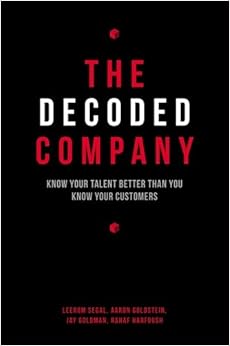The Decoded Company: Know Your Talent Better Than You Know Your Customers by Leerom Segal, Aaron Goldstein, Jay Goldman, and Rahaf Harfoush

Why did I choose this resource?
I chose this resource because it challenges the conventional wisdom about running a business and provides ideas for management changes that could possibly benefit Anant Corporation.
What did you learn from it?
A decoded company — one that is talent-centric, data-driven, flexible, and fast — is one in which the company’s management knows its talent better than it knows its customer. Decoding your company relies on three decoded principles:
- Technology as a Coach and Trainer: personalizing each employee’s experience and providing tailored training precisely at the teachable moment in order to increase emotional engagement, speed up mastery of new skills, and maximize the entire team’s potential
- Data as a Sixth Sense: pairing instincts with analytics (both ambient and reported data) to develop a multi-faceted perspective that takes both data and experience into account and allows for better decision-making
- Engineered Ecosystems: creating a company culture that improves transparency, connectedness, and sense of community while reducing bureaucracy and hierarchical inflexibility
By applying these principles, a company can achieve increased agility and speed, evidence-based decision-making, decreased bureaucracy, and the ability to predict problems before the occur.
Key Knowledge
- Audacious ideas trump incremental thinking; challenge the status quo; radical thinking can pay off
- Depart from one-size-fits-all solutions – have general guidelines that can be adapted/personalized
- Addressing mistakes postmortem and simply adding and adding checks causes the system to slow down until it stops
- “Perfection is achieved, not when there is nothing more to ad, but when there is nothing to take away.”
- Iterate — your business is always in beta
- Question everything, empower risk-taking, keep simplicity
- Rule of 5 Degrees: a small course correction at the start of a journey is much easier than a large correction later
- Don’t just get feedback — feed forward too (not only “you did something wrong a while again,” but also “based on past data and patterns, it looks like you might be about to do something wrong”
- Get real-time feedback
- Keep adjusting your goals — year-long goals not good because you don’t know the situation and you’re blindly setting goals that might be too easy or too hard
- Analyze soft metrics, ambient data, and leading metrics
- “If you get culture right, most of the other stuff like delivering great customer service or building a long-term enduring brand with happen naturally on its own.”
- “In our quest for fairness, we’ve leveled the playing field and made the worse people seem better and the better people seem worse.” Non-decoded companies assume its employees are all the same with the same motivations.
- Deal with the anxiety-boredom continuum: sustain a high enough level of challenge to keep your employees interested without crossing the threshold that would make them stop trying altogether
- Training is an investment
- Three critical factors influence training program’s effectiveness: context (urgency/necessity/relevancy), practice (ability to apply what you learned), and feedback
Ideas that our company or its individuals could use from this?
- HR concierge service
- Weekly reviews
- Use “push” reports, reports that are automatically sent to you, rather than “pull” reports, that you have to retrieve to access
- Have trial contracts with interns for six-months
- Projecting your dashboards on large screens inside the office so everyone can see the numbers that are driving business decisions — “if you put a goal up on a screen in front of everyone, it becomes much more top of mind for people and gets everyone on the the same page”

